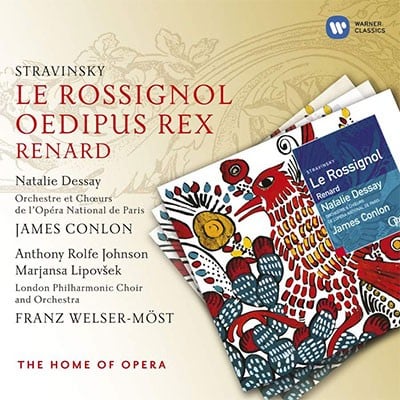Le Rossignol
(The Nightingale) (1908-14, rev.1962)colS,S,A,T,lyrT,Bar,2B; chorus
2.picc.2.corA.3(II=Eb,III=bcl).3(III=dbn)-4.4(III=picc.tpt).3.1-timp.perc(5):cyms/
ant.cym/tgl/SD/BD/2glsp/tamb/tam-t-2harp-cel-pft-gtr-mandolin-strings
Abbreviations (PDF)
Boosey & Hawkes
Like The Fairy's Kiss, also inspired by Hans Christian Andersen, The Nightingale recaptures the fairy-tale world of the composer's childhood. Act I, with its plaintive Fisherman, recalls the romantically iridescent style of Rimsky-Korsakov. Acts II and III, composed some four years later, postdate The Rite of Spring; here, Stravinsky's evocation of a bizarre Chinese court, its bells and lanterns, is a sardonic phantasmagoria. The silvery arabesques and trills of the Nightingale banish Death from the Emperor's bedside. In 1917, the opera was turned into a ballet. Stravinsky: "I had been thinking of making a symphonic poem for orchestra by combining the music of Acts II and III of The Nightingale, which were homogeneous, and I told Diaghilev I would place that at his disposal if he cared to make a ballet of it. He warmly welcomed the suggestion."
Repertoire note by Joseph Horowitz
Stravinsky began work on this opera, based on the Hans Christian Anderson story, as early as 1908, but put it to one side when Diaghilev’s commission for The Firebird came along. By the time he picked it up again just four years later, he was a very different kind of composer, and an international celebrity. The modernist musical style of Acts 2 and 3, containing all sorts of magical effects, is quite different from the glistening Rimsky-influenced music of the first act; nonetheless, the two ‘parts’ fit together effectively. Memorable productions include that of Robert Lepage for Canadian Opera and the staging with David Hockney’s designs for the Metropolitan Opera. The work lasts only around 45 minutes in total so needs to be programmed with a one-act theatre work to make a full evening. It would work well with Stravinsky’s own Renard, for example . Other pairings might include staged versions of Stravinsky’s The Rite of Spring or Oedipus Rex, Ravel’s L’Heure espagnole or Tchaikovsky’s Iolanta.
Repertoire note by Jonathan Cross

Natalie Dessay/Vsevolod Grivnov/Marie McLaughlin/Laurent Naouri/Albert Schagidullin/Maxim Mikhailov/Violeta Urmana/Olivier Berg/Wassyl Slipak/Grzegorz Staskiewicz/
Paris National Opera Chorus/Paris National Opera Orchestra/James Conlon
Warner Classics 4565002
Erato DVD 5442429

